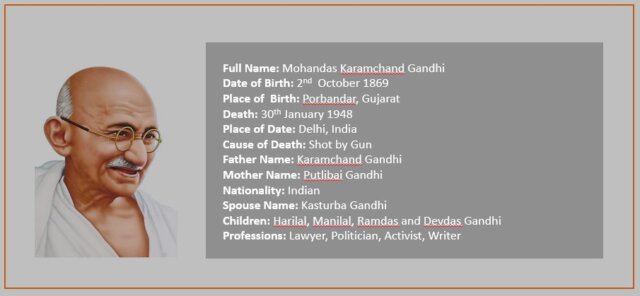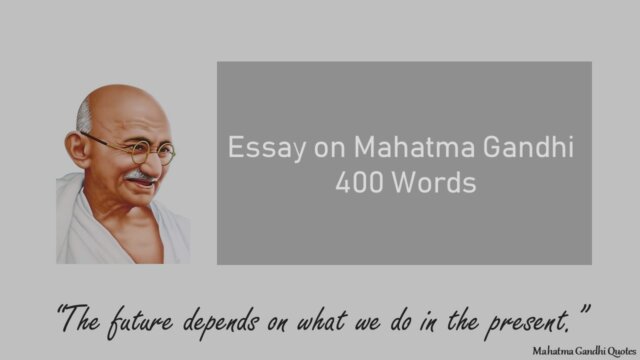Essay on Mahatma Gandhi 400 Words: India’s “Father of the Nation,” Mahatma Gandhi, played a key role in spearheading the nation’s struggle for independence. Born in Porbandar, Gujarat, on October 2, 1869, he was raised in a pious Hindu household and went on to play a significant role in Indian history.
India’s fight for independence from British control was greatly aided by Gandhi’s nonviolent “Satyagraha” doctrine. During his time in South Africa, where he experienced racial prejudice and used peaceful civil disobedience to fight injustice, he created this strategy.
Gandhi became a prominent supporter of Indian rights after his return to India, highlighting the use of truth and nonviolence to bring about social and political change. In contrast to the luxury of other leaders, he led a humble life, which was represented in his attire of a loincloth and shawl.
Gandhi Major Work
Gandhi addressed issues like poverty, education, and untouchability, imagining a society free from discrimination and harmonious. His anti-untouchability movement sought to end this societal scourge and advance equality. A major event occurred in 1930 with the Salt March. Gandhi walked 240 kilometers to the Arabian Sea and began making salt illegally in protest of the British monopoly on the product. This nonviolent deed attracted notice around the world and encouraged others to take up the cause of freedom.
Gandhi’s dedication to nonviolence was put to the test in 1919 following the carnage at Jallianwala Bagh. He stood by his convictions and called for nonviolent protests in the face of British aggression.
His influence went beyond politics to include societal concerns including poverty, education, and untouchability. He imagined a society in which people of all castes and creeds could coexist peacefully.
The 1930 Salt March served as a symbol of civil disobedience and peaceful opposition against the British salt monopoly. Gandhi and his supporters covered 240 miles on foot while making salt in violation of the law, drawing attention from all around the world and serving as an inspiration to others.
Gandhi’s dedication to nonviolence was tested, most notably in 1919 at the violence at Jallianwala Bagh. He supported nonviolent protests in face of British brutality.Civil rights movements around the world are still motivated by Gandhi’s ideas. All ages can relate to his emphasis on individual responsibility, self-control, and moral bravery. Leaders like Nelson Mandela and Martin Luther King Jr. were impacted by Gandhi’s legacy and used his ideas to fight injustice.
In conclusion
Mahatma Gandhi’s life and ideology had a profound influence. He was respected throughout the world for his dedication to social justice, nonviolence, and the truth. Students can find inspiration even in primary school, where they study individual convictions, equality, and nonviolent resistance. Gandhi’s lessons are still applicable today, directing movements in the direction of a fair and compassionate world.

Inspirational and Motivational Quotes by Mahatma Gandhi
- “The best way to find yourself is to lose yourself in the service of others.”
- “First they ignore you, then they laugh at you, then they fight you, then you win.”
- “Live as if you were to die tomorrow. Learn as if you were to live forever.”
- “The weak can never forgive. Forgiveness is the attribute of the strong.”
- “You must be the change you wish to see in the world.”
- “Anger and intolerance are the enemies of correct understanding.”
- “Man should forget his anger before he goes to sleep.”
You May Like below also:

